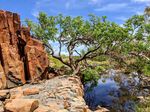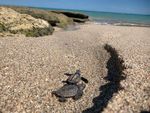Management planning for the Dampier Archipelago
←
→
Page content transcription
If your browser does not render page correctly, please read the page content below
Dampier Archipelago conservation reserves
Management planning for the Dampier Archipelago
Draft joint management plan in preparation
The Dampier Archipelago is made up of 41 islands, recreational values of the islands and include the
islets and rocks located within a 50-kilometre conservation and recreation reserves of Malus,
radius of Dampier and Karratha in Western West Lewis and East Lewis islands. Long-standing
Australia’s Pilbara Region. tenure recommendations and proposed additions
to the conservation estate will also be evaluated.
Twenty-eight of the islands, islets and rocks are
part of Western Australia’s conservation reserve The new joint management plan will provide
system. This includes the major islands of Dolphin, direction to work together to care for country over
Angel, Gidley, Malus, West Lewis, East Lewis, the life of the management plan. It will outline
Enderby, Delambre, Eaglehawk and Rosemary strategies to maintain the key values including the
islands. nature-based recreation experiences whilst
Current management welcoming and encouraging visitors to enjoy,
understand and respect the cultural and natural
All of the conservation reserve islands are vested values of the area.
in the Conservation and Parks Commission of
Western Australia and are managed by the Joint management
Department of Biodiversity, Conservation and
Attractions (DBCA) under the Conservation and Joint management is a partnership between
Land Management Act 1984 (CALM Act). traditional owners and custodians and DBCA to
work together to care for country. It is an
Currently, the nature reserves are managed as per extension of the recognition of traditional owners
the Dampier Archipelago Nature Reserves
and custodians’ role in managing and caring for
Management Plan (CALM 1990). West and East
country and that Aboriginal knowledge and
Lewis islands and part of Malus Island are not
western science together can better protect
covered under the existing plan.
country.
A new management plan
Joint Management Agreement
DBCA is seeking to partner with Murujuga
A Joint Management Agreement (JMA) is a
Aboriginal Corporation (MAC) to protect and
document prepared between joint management
conserve the value of the lands and waters to the
partners which outlines the terms of the
culture and heritage of Aboriginal people through
partnership and sets up the framework for a Joint
a new joint management plan for the reserves.
Management Body (JMB).
The new joint management plan will update
information on the cultural, natural and
June 2022The role of the JMB, which is made up of both DBCA What is the joint planning process? There is also a rich diversity and complexity of terrestrial
senior staff and traditional owners and custodians (as and intertidal communities and habitats across the
MAC and DBCA will work together to prepare the joint islands including mangroves, intertidal reef systems,
nominated by MAC) is to make decisions as part of
management plan. Traditional owner and custodian mudflats and salt marshes.
implementing the management plan.
aspirations, values and concerns for country will be
An example of a JMA is the one between DBCA and MAC integral to the joint management plan. The islands with their beaches, protected bays and
to manage Murujuga National Park via the JMB known as surrounding waters provide a valuable recreational
MAC will be asked to review and endorse the draft joint resource for the local community as well as an
the Murujuga Park Council. The JMA will be attached to management plan prior to it being released for a increasingly significant drawcard within the wider Pilbara
the joint management plan. minimum two-month public consultation period. MAC and State.
will also be involved in considering public comments and
What are the benefits of joint management? finalising the plan. The purpose of the management plan is to protect these
Joint management can provide significant benefits, values.
Cultural information will not be shared without consent
including to: from the appropriate people and all traditional
• foster and facilitate Aboriginal involvement in the knowledge will remain the property of the traditional
custodians.
planning and management of lands and waters
managed under the CALM Act Will management of Murujuga National Park and
• protect and conserve the value of the land to the Dampier Archipelago be the same?
culture and heritage of Aboriginal people
Management of both areas will be complementary but
• utilise the combined knowledge and skills of joint
management partners for improved land/water each will be managed according to their separate
management plans.
management
• develop the capacity of DBCA and Aboriginal partners What about cultural safety?
for effective joint management of CALM Act Many significant values of the islands
lands/waters DBCA will be guided by MAC in how they wish to be
The islands of the Dampier Archipelago have many
• support Aboriginal people to be on country involved throughout the joint management process, in
outstanding values. The Murujuga cultural landscape has
• provide opportunities for Aboriginal people to particular when, where and how to access country and
the largest, densest and most diverse collections of rock Protecting values
achieve economic and social benefits through the how to protect the area’s cultural values.
art, or petroglyphs, in the world. For the traditional
During the planning process the latest knowledge of
joint management of lands and waters owners and custodians the rock art is a living landscape
with an important link to stories, customs and knowledge cultural, natural and recreation values will be considered
• provides funding for Aboriginal corporations to
participate in joint management bodies of the land and connects them to the events and people and management strategies developed to ensure these
• provide opportunities for visitors to experience and of the past and their beliefs today. values are being maintained into the future.
learn about the culture, history and aspirations of The islands are also important refuges for plants and The joint management plan will demonstrate
Aboriginal people. animals once more widespread on the mainland where management and protection of the National Heritage and
they are largely protected from development and the potential outstanding universal values of the area to
Further information on joint management is available on introduced plants and animals. The islands are also be nominated to the World Heritage List. Read more on
the DBCA website. significant breeding sites for three of the six species of the Murujuga World Heritage Nomination on the DBCA
turtles in Western Australia, significant breeding and website.
roosting areas for seabirds and internationally important
feeding and resting sites for migratory shorebirds. The community will have an opportunity to contribute to
the process in which all values including nature-based
recreation are considered in the joint management plan.
Photo credits: DBCA/Various
June 2022Will I still be able to visit the islands? Will there be a marine park?
DBCA and MAC will be managing the islands for A marine park for the Dampier Archipelago is
everyone to visit and enjoy. currently not being progressed. There are many
marine values that will be protected through the
Noting that current management of the islands joint management plan for the islands, such as
includes restricted areas and zoning for camping turtles and their breeding and resting beaches,
and day use. Key management strategies will seabird and shorebird breeding areas and roosts,
Dampier Archipelago conservation reserves
continue to protect areas such as sensitive cultural mangroves and intertidal areas.
sites, turtle, seabird and shorebird breeding,
roosting and feeding areas.
Increased visitor education regarding the
protection of values will also be important.
The plan will identify opportunities for visitors to
enjoy, understand and respect the cultural and
natural values of the area. Recreation
masterplanning will occur concurrently to facilitate
this.
How will joint management affect CALM Act
leases and licences?
There are a number of shacks that are leased to
various groups under the CALM Act. The new plan
and joint management will not affect these existing
leases.
Any future leases and licenses, including renewals,
such as for commercial tour operations will be
assessed against the new plan and considered by
the JMB in addition to the normal departmental
assessment and regulatory processes.
Get involved
Your views are important to us. You are invited to register your interest to be kept informed of
opportunities during the planning process. This may be via newsletter articles, fact sheets, stakeholder
meetings, community workshops or an online survey during the planning process. You will also be notified
when the draft joint management plan is released for public comment. Planning for the joint management
plan will occur throughout 2022 and into 2023.
Please register your interest here https://forms.office.com/r/er98VEtJvJ.
I am a member of MAC, what does this mean for me?
MAC are directly involved in the planning process, please approach MAC as your representative body to ask
how you can be involved in these processes. You can also register your interest through the link above.
Where can I find more information?
For further information, please check DBCA’s website www.dbca.wa.gov.au/parks-and-wildlife-
service/dampier-archipelago or contact the DBCA’s Pilbara Office (Karratha) on (08) 9182 2000.
June 2022You can also read

























































